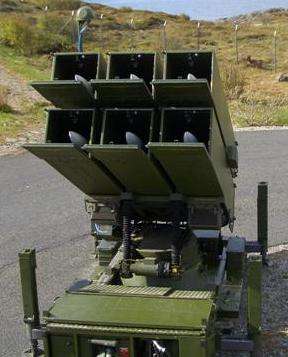Kongsberg Defence Systems
 | |
| Joint-stock company owned by Norway's government | |
| Industry | Military |
| Founded | 1814 |
| Headquarters | Kongsberg, Norway |
Area served | Global |
Key people | Eirik Lie (President) |
| Revenue |
|
|
| |
Number of employees |
|
| Parent | Kongsberg Gruppen |
| Website | https://www.kongsberg.com/en/kds |
Kongsberg Defence Systems (KDS) is one of four wholly owned subsidies of Kongsberg Gruppen (KOG) of Norway and the supplier of defence and space related systems and products, mainly anti-ship missiles, military communications, and command and weapons control systems for naval vessels and air-defence applications. Today, the company is probably best known abroad for its development/industrialisation and production of the first passive IR homing anti-ship missile of the western world, the Penguin, starting delivery in the early 1970s (when KDA was part of KOG's predecessor Kongsberg Våpenfabrikk). As of 2005, Kongsberg Defence & Aerospace had 1,421 employees.
Space related activities are conducted within KDS itself in addition to its subsidiaries, Kongsberg Spacetec (wholly owned) and Kongsberg Satellite Services (50% owned by KDS, 50% by the Norwegian Space Centre), both located in Tromsø. Notable space related products from KDS are the Booster Attachment and Release Mechanisms for ESA's Ariane 5. In the early 1990s KDA was involved with NASA's JPL and Germany's DASA in software development of the test/checkout system, as well as spacecraft hardware production, for the NASA/ESA Cassini-Huygens space probe. KDS has also delivered the Solar Array Drive Mechanism for ESA's Rosetta space probe.
On 22 November 2008 Norwegian Minister of Defence Anne-Grete Strøm-Erichsen opened a new KDA plant that will produce parts for the aircraft recently chosen as Norway's future fighter, the F-35 Lightning II.[1]
Owners and ownership in other companies
It is fully owned[2] by Kongsberg Gruppen ASA (a company that has a majority ownership by Norway's government.)[3]
Its subsidiaries are Kongsberg Spacetec AS, Kongsberg Hungaria Kft, Kongsberg Norcontrol It AS, Kongsberg Defence Corp., Kongsberg Defence Oy, Kongsberg Defence Sp. Z.O.O., Kongsberg Gallium Ltd. and Kongsberg Defence Ltd Co.[4]
It owns 50% of Kongsberg Satellite Services AS.[5]
Toshiba-Kongsberg affair
In 1987, Tocibai Machine, a subsidiary of Toshiba, was accused of illegally selling CNC milling machines used to produce very quiet submarine propellers to the Soviet Union in violation of the CoCom agreement, an international embargo on certain countries to COMECON countries. The Toshiba-Kongsberg scandal involved a subsidiary of Toshiba and the Norwegian company Kongsberg Vaapenfabrikk. The incident strained relations between the United States and Japan, and resulted in the arrest and prosecution of two senior executives, as well as the imposition of sanctions on the company by both countries.[6]
Products
Integrated Director Group (IDG) – radar system for target acquisition
- Penguin – passive heat seeking anti-ship missile
- Naval Strike Missile (NSM) – anti-ship missile with passive imaging heat seeker. Launch from boat and car.
- Joint Strike Missile (JSM) – sea- and land targets missile, launched from aircraft
- Trainers and simulators for different systems
- Mechanic and optomechanic for spaceships
- EriTac – tactical communication
- Multi-Role Radio (MRR) – field radios
- ComBatt – A system for battlefield administration
- Encryption Devices
- NORTaC-C2IS – command- and control systems for tactical operations in the army
- Composite Materials
- MSI-90 uboat system – command and arms control for submarines
- MSI 2005F – system for anti-submarine warfare, for use on frigates
- Senit 2000 – command system for Hauk-class MTBs
- MICOS – mine hunting and minesweeping
- Kongsberg Mission Planning System (KAMP) – tactical system for naval operations
- Minesniper – Remote mine destroyer
- SL-AMRAAM – surface-to-air AIM-120 air defense missiles, both as a separate system in NASAMS and integrated with HAWK
- GBADOC – ground-based airspace control
- Software for E3A AWACS
- NASAMS
- NASAMS 2
Chairman
- Walter Qvam (incumbent as of 2014)[7]
CEOs
The joint CEOs since 2013 are Harald Ånnestad and Espen Henriksen.[8]
See also
References
- ↑ "Kongsberg Defence opens new plant". Norwegian Broadcasting Corporation/Aftenposten. Norway Post. 22 November 2008. Retrieved 22 November 2008.
- ↑
- ↑ "Nřkkelopplysninger fra Enhetsregisteret - Brřnnřysundregistrene". W2.brreg.no. 1997-05-28. Retrieved 2017-05-03.
- ↑ "Kongsberg Defence & Aerospace - Defence Systems - Kongsberg - Se Regnskap, Roller og mer". Proff.no (in (in Norwegian)). 1997-05-28. Retrieved 2017-05-03.
- ↑
- ↑ Seeman, Roderick (April 1987). "Toshiba Case—CoCom - Foreign Exchange and Foreign Trade Control Revision". The Japan Lawletter. Retrieved 2007-09-18.
- ↑
- ↑ "Kunngjřringer - Brřnnřysundregistrene". W2.brreg.no. 2013-01-19. Retrieved 2017-05-03.
External links
- Company website
- Kongsberg Spacetec website
- "KDA part of historic space project" – On KDA's involvement in the Cassini-Huygens mission (from KOG's news archive, 17 January 2005)
 A Kongsberg Defence & Aerospace Penguin anti-ship cruise missile.
A Kongsberg Defence & Aerospace Penguin anti-ship cruise missile. US Seahawk launching AGM-119 Penguin (2002)
US Seahawk launching AGM-119 Penguin (2002) Protector RWS on top of an M1126 Stryker (2005)
Protector RWS on top of an M1126 Stryker (2005) Norwegian NASAMS (2005)
Norwegian NASAMS (2005)
| Wikimedia Commons has media related to Kongsberg Defence & Aerospace. |